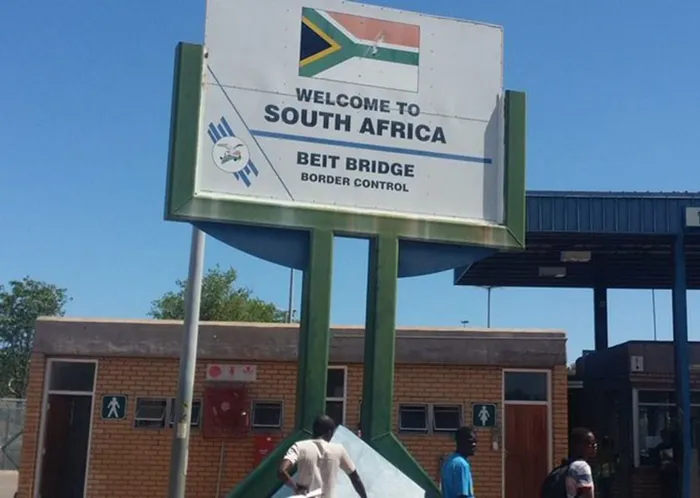
At Beitbridge alone, an estimated R690 million in smuggled goods passes annually, says the author.
Image: Independent Newspapers Archives
At South Africa’s northern border, the crossings continue quietly, steadily and mostly unrecorded. While public debate often centres on the visibility of foreign nationals, the far more consequential reality remains largely neglected: South Africa has not conducted a comprehensive national audit of migration flows in over a decade. There is no integrated system tracking who enters, who stays or how movements across borders intersect with labour markets, infrastructure pressure or regional development. This absence is not merely an administrative gap; it is an entrenched institutional blind spot that weakens governance, inflames public anxiety and erodes our credibility in a continent that is moving towards integration through data.
The Department of Home Affairs, along with other state organs, operates with fragmented or outdated systems. A biometric border management system, budgeted at R400 million between 2020 and 2023, remains partially deployed and disconnected from labour, policing and regional intelligence networks. As confirmed in the 2025 White Paper on Labour Migration, South Africa has yet to establish a functional labour market information system that connects cross-border movement data to national planning. Stats SA’s Quarterly Labour Force Surveys and Mid-Year Population Estimates offer no clear picture of undocumented populations. Civil society and academic estimates vary widely, from 2.5 to over 5 million undocumented migrants. In this vacuum, policies are constructed, services are stretched and myths are allowed to harden into assumptions.
The cost of not knowing is rarely borne by those in power. In practice, this sustained opacity benefits a wide range of actors. At Beitbridge alone, an estimated R690 million in smuggled goods passes annually, enabled by under-monitored crossings and document fraud. Informal labour markets, particularly in construction, agriculture and retail, absorb undocumented workers under exploitative conditions, displacing regulation and depressing wages.
According to a 2022 WIEGO study, 44% of informal traders in Johannesburg’s inner city are foreign nationals, operating with little oversight. At the upper end of the labour market, foreign professionals are frequently hired in sectors such as academia, banking and technology; yet there is no public system for tracking or disaggregating these appointments by origin, skills category or permit status.
This lack of consolidated data limits institutional accountability and makes it difficult to assess either the scale of crossborder hiring or its alignment with national development priorities. For political actors, the absence of reliable data allows migration to become a rhetorical device, one that can distract from policy failures when evidence is lacking.
The implications of this data vacuum stretch across all tiers of governance. Human trafficking, a R10 billion industry in Southern Africa, flourishes in the blind spots between policy and enforcement. The cost of deportation operations alone has reached R1.2 billion over the past two years; funds that could be redirected to stabilising urban infrastructure or creating employment pathways for local youth. South Africa’s 8.9 million NEET youth (not in employment, education or training) compete in an increasingly chaotic labour environment. In the absence of disaggregated skills and migration data, their anxieties are misdirected and their prospects uncertain. Meanwhile, AfCFTA’s R50 trillion market potential, built on the free movement of people and goods, assumes that member states can at least measure who is moving. At present, South Africa cannot meet that assumption.
According to the International Organization for Migration, over 70% of intra-SADC migration, formal and informal, culminates within South Africa’s borders. As neighbouring countries like Eswatini, Mozambique and Namibia become holding zones or corridors for redirected global migration, South Africa increasingly absorbs the outcome of upstream policy decisions. In the absence of regional coordination and continuous cross-border insight, onward movement into South Africa becomes both untraceable and increasingly difficult to manage. Yet without this capacity, we remain unaware of the scale, the conditions and the consequences. The lack of coordination across the region is now more than a technical failure; it is a strategic risk.
Migration data is more than a governance tool; it is a lever for national development. The 2023 Africa Migration Report shows that countries linking mobility to infrastructure, skills and labour planning see stronger growth and more social cohesion. Africa’s growth now hinges on human mobility: artisans, engineers, students and informal traders moving across borders. Yet South Africa has not embedded mobility into its planning frameworks. In the absence of integrated data systems, migration remains untracked, unaligned and undervalued. As data scientists and statisticians gather this November, from the South African Statistical Association’s summit in Gauteng to the Global Data and AI Summit in Nairobi, African states are preparing to lead with insight. South Africa must do the same.
South Africa’s leadership in Africa cannot rest on sentiment alone. True Pan-Africanism is not about borderless idealism; it is about accountable systems, shared data and the ability to protect both sovereignty and solidarity through intelligence and cooperation. Until we have the capacity to measure movement, protect labour markets and coordinate with neighbours, liberalisation is not visionary; it is volatile. Pan-Africanism must evolve from declarations to data. That is how we protect the integrity of regional integration.
The answer lies not in simply closing borders but in building intelligent ones. South Africa’s ability to respond begins with a national migration audit, conducted over 12 months and grounded in interdepartmental collaboration. A digitally enabled migration observatory, anchored in Pretoria and integrated with SADC partners, would help close critical information gaps and restore transparency. This should be complemented by a real-time regional registry and a public-facing dashboard that informs rather than inflames national debate.
This is not just a state imperative; it is a national one. Training up to 100 000 NEET youth in migration analytics, digital registry design and regional coordination would create new professional pathways while restoring confidence in the function of the state. Private sector institutions, from banks to transport firms, must also align to new standards of identity verification and border logistics, investing in systems that support clarity and social cohesion.
Cities such as London and countries like Morocco demonstrate that well-resourced migration data systems, when implemented with robust oversight, can build coordination and accountability; though even these models must guard against overspend and privacy breaches. Africa is not short of talent or templates. What we need is clarity of vision and the institutional courage to act on what we find.
South Africa risks falling behind not because migration is inherently destabilising but because we do not see it clearly enough to manage it constructively. Visibility is no longer optional. It is a strategy for sovereignty, cohesion and credibility in a regional future already unfolding around us.

Nomvula Zeldah Mabuza is a Risk Governance and Compliance Specialist with extensive experience in strategic risk and industrial operations. She holds a Diploma in Business Management (Accounting) from Brunel University, UK, and is an MBA candidate at Henley Business School, South Africa.
Image: Supplied
Nomvula Zeldah Mabuza is a Risk Governance and Compliance Specialist with extensive experience in strategic risk and industrial operations. She holds a Diploma in Business Management (Accounting) from Brunel University, UK, and is an MBA candidate at Henley Business School, South Africa.
*** The views expressed here do not necessarily represent those of Independent Media or IOL.
BUSINESS REPORT